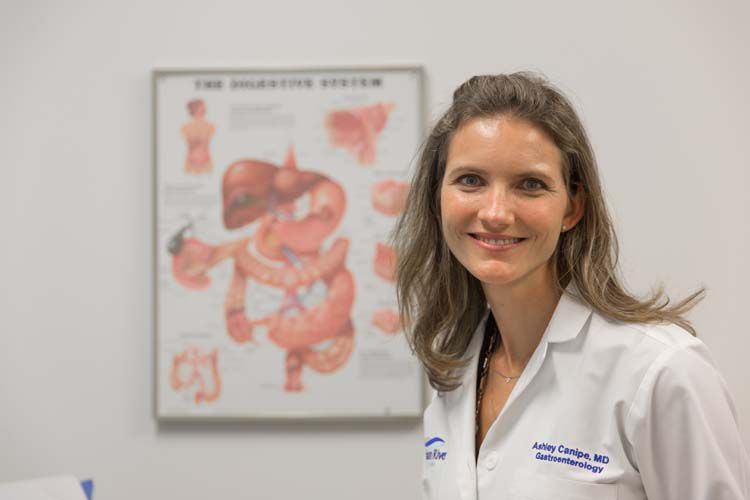
Nobody really likes to talk about hemorrhoids – well, nobody who isn’t a gastroenterologist, anyway.
Fortunately, Dr. Ashley Canipe at the Indian River Medical Center isn’t bashful about how to best deal with the swollen veins of the anus and lower rectum we call “hemorrhoids” or “piles.”
“It really is routine,” says Canipe. “It’s part of what I do.”
The Mayo Clinic reports that “nearly three out of four adults will have hemorrhoids from time to time,” while adding “the exact cause often is unknown.”
Symptoms include “rectal pain, itching, bleeding and possibly prolapse or hemorrhoids that protrude through the anal canal,” according to Harvard Medical School. “Everyone has hemorrhoids: the pillow-like clusters of veins that lie just beneath the mucous membranes lining the lowest part of the rectum and the anus. The condition most of us call hemorrhoids develops when those veins become swollen and distended, like varicose veins in the legs. Because the blood vessels involved must continually battle gravity to get blood back up to the heart, some people believe hemorrhoids are just part of the price we pay for being upright creatures.”
But since moving about on all fours isn’t really a desirable option for most folks, understanding as much as possible about hemorrhoids is probably the next best thing and Canipe is an approachable expert.
“Hemorrhoids are really a normal structure,” she says. “If you’ve ever been pregnant or lifted heavy things, you’re going to have hemorrhoids. The question is, really, do they bother you or not. If they don’t bother you then we don’t bother them. That’s the bottom line.”
But there are bottom lines and then there are bottom lines.
For instance, Preparation H, one of the world’s best-selling hemorrhoid treatments, was acquired by Pfizer Pharmaceutical in a $68 billion deal. And that was back in 2009. (It may be a measure of how bashful people are about the condition, or how desperate they are for relief, that BusinessInsuranceQuotes.com says Preparation H ointments, creams and suppositories are among the most frequently shoplifted products in the country today.)
Despite the popularity of the over-the-counter remedy, Canipe points to what she calls “healthy toileting habits” as an infinitely better first step in treating hemorrhoids.
“That means only allowing two, three minutes, up to five at most,” according to Canipe, “to have a bowel movement. When you sit on the toilet you just want to let it happen. If it doesn’t happen you need to get up and do something else and then come back when you feel the urge again. You don’t want to sit on the toilet because that allows the connections of the hemorrhoids to the rectal wall to prolapse down further with gravity. It’s a gravity thing.”
And, Canipe warns, “No reading, no iPad. You just do your thing and get up. It’s not a place to hang out or watch TV.”
Increasing fiber in your diet is another of Canipe’s suggestions. She is a big fan of “My Fitness Pal,” a website and iPhone app to monitor fiber intake. “The typical American diet,” Canipe states flatly, “is about 15 grams of fiber a day. We need to be getting twice that.”
And, if hemorrhoids do become a problem, says Canipe, don’t over-do your cleansing routine.
“You just want to wash yourself with a mild soap and water and then just leave it alone,” say the matter-of-fact Canipe. “No lotions, potions or loofahs. Don’t scrub it; don’t put a bunch of stuff down there. Our anuses have these normal mucus glands and it’s meant to be a little bit acidic down there. When you start to change the PH, that can actually contribute to the itching and the breakdown of the skin, which then can contribute to the irritation.”
Sometimes, however, people do need more than fiber and warm, soapy water. Sometimes a procedure called “hemorrhoid banding” is the best bet to provide relief.
The quick, in-office procedure involves a small rubber band being tied off at the base of the hemorrhoid pillow making it shrink and disappear. Canipe explains, “There’s no sedation required and it’s a fast procedure. Just 10 minutes or less. The outcomes are very good and the risks are very low.” But it’s not something she expects or even wants people to come in and ask for.
In a few very, very rare instances, it is possible a full-blown surgical procedure called a “hemorrhoidectomy” might be indicated, in which case Canipe would refer the patient to a surgeon.
Dr. Ashley Canipe is with the Indian River Medical Center. Her office is in the new Health and Wellness building at 3450 11th Court, Suite 206 in Vero Beach. The phone number is 772-299-3511.



